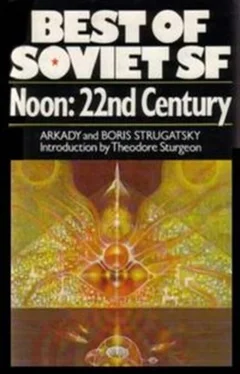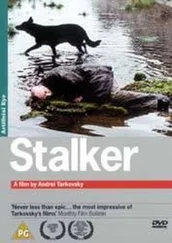Novago looked at the black water. A delicate pattern of ice was already forming on it.
Mandel glanced at his watch. “It’s eighteen-twenty now. We should be there by midnight.”
“Midnight,” Novago said dubiously. “Right at midnight.”
There are thirty kilometers left, he thought. Of which we’ll have to cover twenty in the dark. Of course we do have infrared glasses, but it’s still a bum deal. Something like this would have to happen… In the crawler we would’ve arrived before dark. Maybe we should go back to the base and get another crawler? But the base is forty kilometers away, and all the crawlers are out, and we’d get to the settlement tomorrow morning, which would be too late. Damn, what a mess this has turned out to be!
“Never mind, Pyotr,” Mandel said, and slapped himself on the thigh, where under his coat a pistol hung in its holster. “Let’s get a move on.”
“Where are the instruments?” Novago asked.
Mandel looked about. “I threw them off,” he said, “Aha! Here they are.” He took a few steps and picked up a small valise. “Here they are,” he repeated, brushing sand off the valise with the fur sleeve of his coat. “Shall we go?”
“Let’s go,” said Novago.
They crossed the valley, scrambled up a dune, and started down again. The going was easy. Even the one-hundred-and-eighty-pound Novago, together with oxygen tanks, heating system, fur clothing, and lead-soled boots, weighed less than ninety pounds here. Small, lean Mandel walked as if he were out for a stroll, casually swinging the valise. The sand was firm, caked together. Walking on it left almost no footprints.
“I’m really going to get it from Ivanenko about the crawler,” Novago said after a long silence.
“What are you talking about?” objected Mandel. “How could you have known that there was a cavity there? And anyhow, we discovered water.”
“The fact is the water discovered us,” Novago said. “And I’ll catch it for the crawler all the same. You know old Ivanenko—’Thank you for the water, but I’ll never trust you with a crawler again.’”
Mandel laughed. “Never mind, it’ll blow over. It won’t even be all that hard to tow out the crawler—look, what a beauty!”
On the crest of a nearby dune, with its fearsome triangular head turned toward them, sat a mimicrodon—a seven-foot lizard, brick red in imitation of the color of the sand. Mandel threw a pebble at it, but missed. The lizard crouched there with its legs spread, unmoving, like a piece of stone.
“Proud, beautiful, and imperturbable,” said Mandel.
“Irina says that there are a lot of them around the settlements,” said Novago. “She feeds them.”
By unspoken agreement they increased their pace.
The dunes came to an end. Now they were walking over a level salt flat. Their lead soles slapped resoundingly against the congealed sand. Great patches of salt glittered in the rays of the white setting sun. Around the patches, spheres of cactus bristling with long needles showed yellow. There were a lot of these strange, rootless, leafless, stemless plants on the flat.
“Poor Slavin,” said Mandel. “He’s worrying, no doubt.”
“Me too,” Novago muttered.
“Well, you and I are doctors,” Mandel said.
“So we’re doctors. You’re a surgeon and I’m an internist. I’ve performed a delivery exactly once in my life, and that was ten years ago in the best clinic in Archangel, with a full professor standing behind my back.”
“Never mind,” said Mandel. “I’ve done several deliveries. Everything will be O.K.”
A prickly sphere appeared at Mandel’s feet. Mandel kicked it skillfully. The ball described a long, gentle arc in the air, then started rolling, bouncing up and down and breaking off needles.
“It’s a kick, and the ball slowly rolls off,” Mandel said. “It’s something else that’s bothering me: how will the child develop under conditions of reduced gravity?”
“That’s the one thing not bothering me,” Novago said firmly. “I’ve already spoken with Ivanenko. We can set up a centrifuge.”
Mandel thought a moment. “It’s an idea,” he said.
As they were skirting the last salt patch, there was a shrill whistle, and a sphere ten paces from Novago rushed high into the sky and, trailing a whitish tail of moist air behind it, flew over the doctors and fell into the center of the salt patch.
“Damn!” shouted Novago.
Mandel laughed.
“What an abomination!” Novago complained. “Every time I go by a salt patch, one of these damn—”
He ran up to the nearest sphere and kicked it clumsily. The sphere clung with its needles to the bottom of his coat.
“Damn!” Novago snapped again. With great difficulty, as he walked, he tore the sphere first off the coat, then off his gloves.
The sphere fell onto the sand. It was supremely indifferent. So it would lie, entirely motionless, sucking in and compressing the rarified Martian air, until suddenly it let it all out at once with a deafening whistle, and shot like a rocket for thirty or forty feet.
Mandel suddenly stopped, looked at the sun, and brought his watch up before his eyes. “Nineteen thirty-five hours,” he muttered. “Half an hour and the sun will set.”
“What did you say, Lazar?” Novago asked. He stopped too and looked at Mandel.
“The bleating of the kid lures the tiger,” Mandel said. “Don’t talk so loudly when it’s almost sunset.”
Novago looked around. The sun was already very low. Behind, in the valley, the shining salt patches had already winked out. The dunes were dark. The sky in the east had grown as black as India ink.
“Right,” said Novago, looking back. “No sense in talking loud. They say it has very good hearing.”
Mandel blinked his frost-covered eyelashes, bent down, and drew his warm pistol from its holster. He drew the bolt back with a click and shoved the pistol into the top of his right boot. Novago got out his pistol too, and inserted it into the top of his left boot.
“You shoot left-handed?” Mandel asked.
“Yes,” Novago answered.
“Good,” said Mandel.
“They say it helps.”
They looked at each other, but by now it was impossible to make out anything above the masks and below the fur trim of the hoods.
“Let’s go,” said Mandel.
“Let’s go, Lazar. Only now we should walk single file.”
“Okay,” Mandel agreed cheerfully. “Dibs on going first.”
And they went on: Mandel first with the valise in his left hand, and Novago five paces behind him. It’s getting dark really fast, Novago thought. Twenty kilometers left. Well, maybe a little less. Twenty kilometers through the desert in total darkness… and any second it could jump us. From behind that dune, for instance. Or from that one, farther on. Novago shivered. We should have left this morning. But how could we know that there was a cavity on the route? Amazingly bad luck. But still, we should have left this morning. Or even yesterday, with the rover taking the diapers and equipment to the settlement. Or no, Mandel did an operation yesterday… It’s getting darker and darker. No doubt Mark is already fretting. Running to the tower again and again to see whether the long-awaited doctors are coming. But the long-awaited doctors are slogging through the sand in the desert at night. Irina tries to calm him down, but of course she’s worried herself. It’s their first child, and the first child born on Mars, the first Martian. She’s a very healthy and steady woman. A wonderful woman! But in their place I wouldn’t have had a child. Well, it will all work out. But if only we hadn’t been delayed…
Читать дальше












